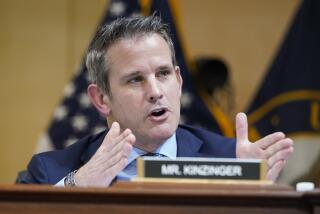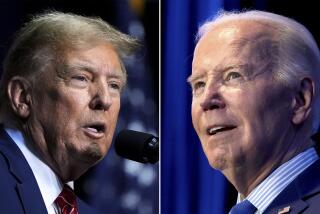PRIMARY PREVIEW : Texas GOP Ready to Give Cool Nod to Dole in Place of Gramm : With favorite son out of the race, Lone Star Republicans see their job as unifying party behind likely nominee. Winner on Tuesday gets 123 delegates.
- Share via
HOUSTON — Pragmatism, not passion, is expected to guide Texas Republicans in the state’s Tuesday primary. It’s a trade-off that state GOP leaders will gladly take.
True, they were more enthused just a few months ago. The home-state contender--Sen. Phil Gramm--was bolstered by big bucks and the backing of the popular new governor, himself the son of the last Republican president. With 123 delegates at stake--second only to California’s 165 as the biggest prize of the nominating season--the primary was going to be more like a GOP jamboree than a routine trip to the polls.
But as in the other six states that with Texas comprise the “Super Tuesday” slate of contests, the thrill is gone as the vote approaches. The contests, offering a total of 362 delegates, once loomed as a potentially pivotal moment in the GOP campaign. But with Senate Majority Leader Bob Dole of Kansas having so clearly lapped the field, the primaries seem destined merely to add to his overwhelming momentum.
In Texas, when Gramm’s campaign sputtered out, so did the excitement. Republican leaders turned to their second choice, Dole, the seemingly inevitable nominee. Although they did so with some resignation, it was also with a sense of relief: Rather than fuel a bitter internecine battle, Texas saw a chance to help unify the GOP in its ultimate bid to win back the White House.
*
“Bob Dole may not be the candidate we view as the perfect candidate, but he has the best chance of beating Bill Clinton in November,” said Tom Pauken, chairman of Texas’s burgeoning Republican Party. “I think voters recognize that and just want to get on with the process.”
Much the same sense pervades the Super Tuesday campaigns in Florida, Louisiana, Mississippi, Oklahoma and Tennessee. The one Super Tuesday state that remains somewhat unpredictable is Oregon--but the uncertainty stems largely from the state’s method of voting.
As it did in its recent special election to fill the Senate seat vacated by Republican Bob Packwood, Oregon’s primary is being conducted by mail. That means ballots have been in the hands of voters--and in some cases returned--since Feb. 23, just three days after Patrick J. Buchanan upset Dole in the New Hampshire primary and, for what turned out to be a short period, threw the GOP race into turmoil.
“My guess is that when the results are toted up, it could be that Buchanan will actually do pretty well in Oregon relative to his showing in a number of other Super Tuesday states,” said Bill Lunch, a political scientist at Oregon State University. “It’s counterintuitive, because this is a northern and relatively liberal state. But if you depress turnout enough, you have to ask who is left? The answer in Oregon is the most reliable Republican voters are associated with the religious right.”
Dole appears to have no such worries in Texas. A poll in Friday’s Houston Chronicle showed a hefty 57% of Republicans statewide supporting him, followed by 18% for Buchanan and 8% for Steve Forbes. More important, the poll reported, Dole is the only one of the three who would beat Clinton in the state in a head-to-head contest, winning 53% to the president’s 38%
“Texas Republicans are sort of at maximum strength right now,” said Bill Miller, an Austin political consultant. “They may not be real excited about Dole, but they do like the fact that they’re big and they’re in control--and this guy’s not going to drive a wedge into their newly minted party.”
Buchanan, who wants to do just that, is hoping to take advantage of Dole’s lukewarm backing. Under the state’s formula for divvying up delegates, Buchanan can score a share of the booty if he wins more than 20% of the vote in any congressional district and limits Dole to less than 50%.
To that end, Buchanan scheduled a series of grass-roots rallies this weekend in several small, carefully selected rural communities--”districts that don’t have very many upper middle-class or old-line Republicans,” said Richard Murray, a political scientist at the University of Houston.
Although it’s doubtful that Buchanan could win enough delegates in Texas to upset Dole’s march toward the nomination, he could win enough here to give his voice a boost at the August Republican national convention in San Diego. “It would just make for a more interesting get-together,” Murray said.
Buchanan’s effort could get an unintentional hand from Gramm, who has been advertising heavily for reelection to the U.S. Senate, despite only minimal opposition. With his name still on the presidential ballot, Gramm is expected to draw a chunk of protest votes.
He has already received one from Clara Sandstedt, vice chairwoman of the Brazos County Republican Party, who told the Dallas Morning News that she “felt like the wedding had been called off” when Gramm bowed out of the presidential race in mid-February.
Forbes has mounted little effort in Texas; he committed no money, for instance, to a media campaign. But he did spend Friday in the state, using the Alamo in San Antonio as the backdrop for a pledge to continue his longshot battle for the nomination.
Dole, meanwhile, is so confident of victory that, after a quick visit earlier this week, he isn’t even scheduled to campaign here again until Monday. When he arrived Wednesday to receive encouraging words from former President Bush and a direct endorsement from his son, Gov. George W. Bush, Dole left the same day without stumping for a single vote.
“We would like to think that we’re important and that candidates would feel like they need to be here,” lamented Betsy Lake, chairwoman of the Harris County Republican Party, which encompasses the Houston metropolitan area. “You know, Harris County’s bigger than New Hampshire--it’s actually bigger than 29 states as far as voters--and I still haven’t seen any ads from Forbes or Dole or Buchanan.”
Dole’s endorsement from Gov. Bush, which seemed to cement the Senate majority leader’s standing in Texas, was symbolic of the compromises that Texas GOP leaders have made.
After Gramm dropped out and endorsed Dole, Bush remained officially neutral. Still, he was widely considered a closet supporter of Lamar Alexander, the former Tennessee governor who served as education secretary under Bush’s father. When Alexander announced his presidential campaign last year, he spent the night as Bush’s guest in the Governor’s Mansion.
*
Dole, on the other hand, had clashed bitterly with Bush’s father when they were rivals in the 1988 GOP campaign. Although their relationship is said to have mended, Gov. Bush waited until Alexander pulled out of the race before throwing his support behind Dole.
Rob Mosbacher Jr., son of the former Commerce secretary under President Bush and manager of Alexander’s Texas campaign, said it was in the GOP’s best interest for all concerned to rally behind Dole. But he conceded it hasn’t been easy. “We’ll have to warm up to the task,” Mosbacher said.
Texans at least received some personal attention from the candidates; Oregon, like most other Super Tuesday states, have caught at best fleeting glances.
Buchanan hasn’t stopped in Oregon since last year. Last week, however, his campaign began airing a radio ad in the Portland area criticizing Dole for not committing himself to name a running mate who opposes abortion.
Dole stumped the state in late February as the ballots were being mailed out. He stressed his support for free trade, a key issue in a state heavily dependent on foreign commerce.
Times staff writer Kim Murphy contributed to this story.
More to Read
Get the L.A. Times Politics newsletter
Deeply reported insights into legislation, politics and policy from Sacramento, Washington and beyond. In your inbox twice per week.
You may occasionally receive promotional content from the Los Angeles Times.







